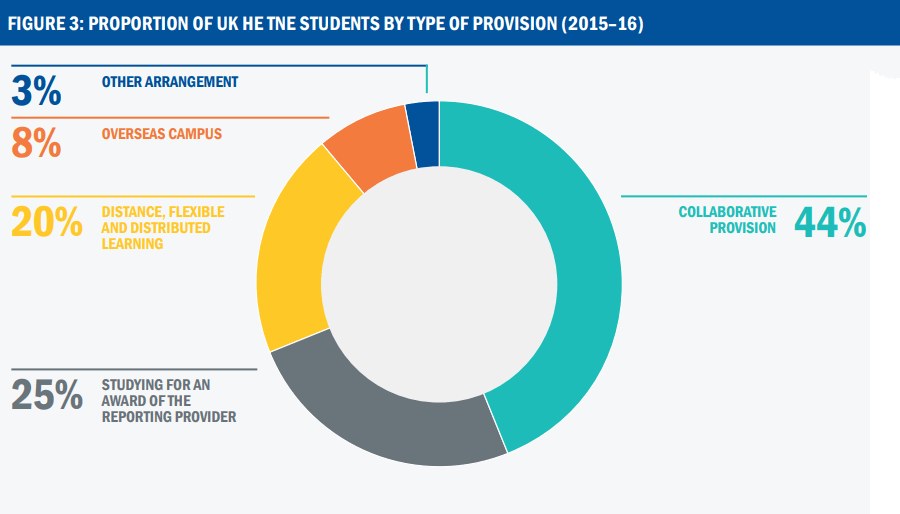Patterns of change in UK provision of higher education overseas

New report shows scale and scope of UK higher education TNE through regional breakdowns for the first time
- UK higher education transnational education (TNE) provision grew by 17% from 2012-13 to 2015-16
- There were 1.6 times the number of students studying for UK awards overseas than there were international students studying within the UK
- 82% of UK universities offered some form of higher education TNE
- Malaysia and Singapore remained the top host countries for UK higher education TNE
- The number of students studying for UK degrees in each of the world’s eight geographical regions increased by between 5% (EU) and 41% (Africa) from 2013-14 to 2015-16, although two regions (non-EU Europe and North America) experienced declines in student numbers from 2014-15 to 2015-16.
- Asia hosted the majority of UK HE TNE students (52%), followed by Africa (15%), the EU (13%), the Middle East (11%), North America (5%), non-EU (3%), Australasia (1%) and South America (less than 1%)
- Of the 20 countries which hosted the most students, 7 were in Asia, 6 were in the Middle East and Africa, 4 were in Europe and 3 were in the Americas showing take-up of UK higher education TNE across mature and emerging economies
- 76% of students were on academic programmes in these 20 countries
These are the key findings of a new report by Universities UK International (UUKi).
The Scale of UK higher education transnational education 2015-16 is the first report to look at TNE data in such depth. As well as examining where UK higher education TNE students are studying, the report looks at the split between undergraduate and postgraduate study and at the different types of provision. This is analysed at both global and regional levels.
Trends from 2012-13 to 2015-16 have been identified through a detailed analysis of the Higher Education Statistics Agency Aggregate Offshore Record (HESA AOR) data.
The report demonstrates that UK higher education TNE is growing in both scale and strategic importance. This is underscored by HESA’s First Statistical Release of 2016-17 data, released on 11 January 2018. The 2016-17 summary data shows that 707,915 students were studying for UK degrees overseas.
With 82% of UK universities offering transnational education, this higher education TNE should be an important component of the UK government’s education export strategy. The report notes that TNE helps to cement and maintain bilateral education connections between the UK and its many global partners.
The report shows:
- Two thirds of TNE students were undergraduates and a third were postgraduates
- 44% of the students were studying through collaborative provision which includes joint degrees
- Just 8% of students were studying through a branch campus
- However, distribution by type and level of study differed greatly across regions.
As many countries look to meet demand for higher education and address skills gaps, they have demonstrated enthusiasm to host UK TNE programmes.
UUKi expects to see new markets opening for UK institutions to deliver TNE, continuing this trend.
The number of UK higher education TNE students grew from 2013-14 to 2015-16 in the already popular TNE locations of Asia and the Middle East, suggesting these are not saturated with provision.
Quality assurance frameworks help to communicate to global partners the continued excellence in the UK’s education offer.
At the same time, new approaches and innovative models which are context-sensitive and work collaboratively with local policy makers and/or partners maintain the UK’s position as a leader in providing awards overseas.
Director of UUKi, Vivienne Stern comments:
“This report shows a fascinating picture of the scale and scope of UK university TNE. Drilling down for the first time into both the level of study and mechanism, it is essential reading for those in international university and policy roles. I’m proud that our sector is at the forefront of delivering education through innovative international partnerships, as evidenced in the report. UUKi is committed to supporting the sector and the UK Government in providing intelligence which informs TNE strategies and approaches as we pursue our shared objective of expanding and enhancing meaningful higher education partnerships overseas”











Responses